
10 Jun 2024
Running for dad and living life to the full
Eric Witham’s daughter Julie Hewson raised over £2600 for Leukaemia UK by running the London Marathon in 2024. Julie’s incredible effort was driven not just by a desire to fund research into kinder, more effective treatments, but by her father’s incredible last words to her, urging her to go out and live life to the full.
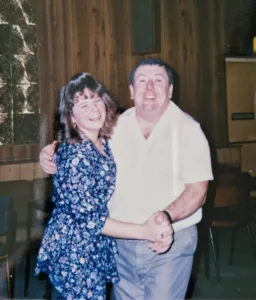
Eric with daughter Julie
Eric’s first symptoms of what would eventually be diagnosed as leukaemia began in 2004. The 58-year-old retired worker for the ICI company from Stockton-on-Tees was experiencing mysterious groin pain and being treated for stubborn acid indigestion. His wife Sheila also noticed that he was losing weight.
“He first visited his GP about the pains in his groin multiple times,” said Julie, 55, who works as a teaching assistant in Stockton-on-Tees. “I won’t say he was fobbed off, but it just felt impossible to make any progress with what was wrong with him, and he rarely saw the same GP. Then eventually he saw a new doctor who said to him something wasn’t right and got him booked in for a blood test. By that time, Dad had bruising on his body as well. He was a keen gardener, but these bruises were beyond him just knocking himself in the garden.”
The blood test showed Eric had anomalies in his white blood cell count. So his GP referred him to the haematology unit at North Tees General Hospital (now the University Hospital of North Tees).
“At that point we didn’t think it was anything serious. We just thought they’d found something and needed to check it out. Once Dad was in hospital though, things moved quickly, and the shock of his diagnosis hit us all. After all, he’d been showing symptoms for around a year by that point.”
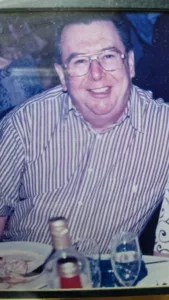 In May 2005 Eric was diagnosed with acute myeloid leukaemia (AML). The acid indigestion had been due to an enlarged spleen. His treatment started immediately, with regular blood transfusions and chemotherapy. He spent periods in hospital, and the rest of the time he was cared for at home by Sheila, with Julie and her brothers all pitching in.
In May 2005 Eric was diagnosed with acute myeloid leukaemia (AML). The acid indigestion had been due to an enlarged spleen. His treatment started immediately, with regular blood transfusions and chemotherapy. He spent periods in hospital, and the rest of the time he was cared for at home by Sheila, with Julie and her brothers all pitching in.
“He got very poorly quite quickly and must eventually have been in and out of hospital over a dozen times. The blood transfusions would perk him up, but then he’d go downhill again. We thought him having lots of transfusions was a good thing, but his body was killing all the lovely blood people had donated. We only realised it after he passed away. I’ve given blood since I was 18 and I have a rare blood type. I’ve donated over 50 pints now. It really showed us how important it is to be a donor.
“Dad had an amazing consultant – Dr Dennis. And Dad remained so positive and strong. He believed he was going to get better; he never gave up and that helped us. He was quite a big chap – in build and character – but I saw him shrink before my eyes. He lost his appetite and most of his hair. Mum really struggled mentally as she didn’t drive and was very reliant on him – he was actually my stepdad, but they’d been together since the 1970s when I was around five. So I had to support her too, as well as my children who were 11 and 12, who found it difficult seeing what was happening to their grandad.”
Sadly, it soon became clear that Eric was becoming more and more ill, and the blood transfusions and chemotherapy were no longer working. Shortly after his final admission to hospital he had a stroke, and Julie and her family were told to prepare themselves for losing him.
“The hospital was absolutely amazing. Mum could stay with him all the time until the end, and we could come and go whenever we liked. We told him the prognosis two days after the doctors had spoken to us – we needed time to process the news. He said, ‘well that was a bit of a shock’. And it was because at that point he was still eating and drinking a bit.”
Eric’s words to Julie in the last days of his life had a lasting impact on her.
“Dad and mum had visited over 40 countries and had the most amazing full lives. Towards the end one day I was giving him some homemade spaghetti bolognaise as he didn’t like the hospital food. He suddenly grabbed my hand and said, ‘don’t wait’. I knew exactly what he meant – to live my life to the full.”
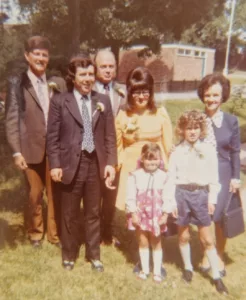
Eric and family at a wedding
Eric passed away on 17th July 2007 at the age of just 62. “He died at 7pm exactly – the time I had said to him I’d be back to see him when I’d left earlier. But I was two minutes late. It was awful at the time – I shouted at him ‘why didn’t you wait’? But I laugh about it now as that was typical Dad – telling me off for being late!”
Since losing Eric, Julie has more than taken her dad’s advice. She went back to college and retrained to be a classroom assistant. She now works at a school in a role that she feels passionate about. She and husband Richard have bought a holiday home in Turkey, and a caravan to tour round the UK. Julie also started running again, a childhood activity that she has now fallen back in love with and has now led to her running multiple marathons.
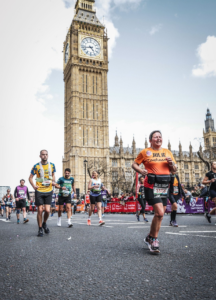
Julie running the London Marathon for Leukaemia UK in 2024
“I did cross country running at secondary school and Dad would take me all over the northeast of England for competitions, come rain and shine. It’s been amazing getting back to it, I love it. I’ve run several half marathons for different charities, and in April 2024 I ran the London Marathon for Leukaemia UK. I can’t say how much it meant to me to see the orange banners and the Leukaemia UK team cheering me on as I came over Tower Bridge. I don’t think I stopped smiling the whole way round. I’ve now got a ballot place for the New York marathon at the end of the year. I’m not a fast runner, I just love being outside and with friends. When I found out I’d been chosen for the event in New York, I screamed and ran around the room. My daughter is into running now so we’re hoping to do a marathon together one day.”
Julie raised over £2600 for Leukaemia UK from the 2024 London Marathon which will help fund research into kinder, more effective treatments that will give people like Eric a better chance of survival.
“Mum is quite poorly now with Alzheimer’s and mixed dementia, and also multiple myeloma, which is a slow-burning form of cancer. But I’ve shown her the films of me running, and she’s my biggest supporter. When she was diagnosed with myeloma four years ago, the doctor actually said Dad would have had a bigger chance of survival if he’d been diagnosed now. That’s how far the treatments have come in just 20 years, and that’s why funding research is so important.”
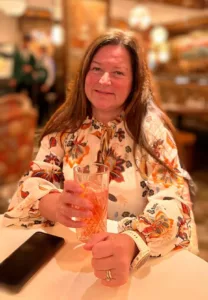
Julie nowadays
Discover more stories from our community.
Related posts
23 October 2024
Leukaemia UK announces innovative projects by four female researchers addressing aggressive blood cancers
Leukaemia UK has today announced it will invest £600,000 into four groundbreaking research projects aimed at developing kinder, more effective treatments for various aggressive blood cancers, including acute myeloid leukaemia…
15 February 2024
Vogue model who survived leukaemia as a child joins Leukaemia UK in calling for more donations for research to stop blood cancer ‘destroying childhoods’
Vogue model Saffron Vadher has joined Leukaemia UK on International Childhood Cancer Day (February 15th) in calling for more research into the blood cancer. Leukaemia is the most common type…
10 November 2021
An urgent call from One Cancer Voice group of cancer charities for the Comprehensive Spending Review to deliver Government commitments to improve cancer survival & care
Leukaemia UK has joined with 50 other cancer charities in writing to the Prime Minister, Chancellor of the Exchequer and Secretary of State for Health and Social Care. We are calling on the Government to urgently deliver on commitments to improve cancer survival and care in the forthcoming Spending Review.
12 December 2022
Widespread coverage of new leukaemia therapy shows promise in first trial patient
As you may have seen in the news over the weekend, a clinical trial investigating a new leukaemia treatment has shown promising results. As part of the trial, funded by…